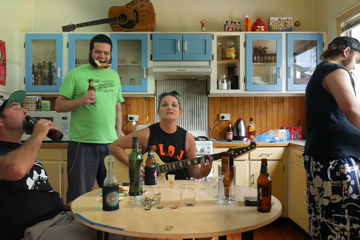
Those lofty paragons of creative genius installed in the pantheon of art's great minds are often absolved of any grubby mortal shortcomings - to blemish their legend with any suggestion of human weakness is nigh on blasphemy. But if we dare look past this squeaky-clean reverence, the reality is altogether more plebeian: Beethoven was a drunk; Picasso was a misogynist; Niche was in love with his sister. Tut tut.
The trio of Brontë sisters were no doubt similarly prone to these earthly flaws, and their canon of writings were likely therapy as well as fiction. Raised on the blasted heath of the Yorkshire moors, often left on their own, isolated from the outside world yet in a hothouse of competing imaginations, their stories of barely-tamed passions, deranged attic dwellers, and forbidden romance may reveal personal yearnings unsatisfied in their bleak, cloistered lives
As if reflected in a Freudian funhouse mirror, Jen Silverman's sexually-pumped gothic fantasy, The Moors, offers a surrealist satire that both ribs and relishes the Brontë's lives and writings. The very embodiment of the desolate Yorkshire countryside, mistress of the manor Agatha (Alex Aldrich) is both forbidding and formidable. She seems capable only of various degrees of disdain, which she liberally directs at her daffy yet downtrodden sister Huldey (Anna McCarthy), a girl with churlish dreams but a dearth of talent. A sometimes pregnant sometimes typhoidal scullery maid (Grace Lowry), who goes by the name Marjory or Mallory depending on where she happens to be, is a totem of underclass resentment, dutiful yet full of contempt for her betters. Into this collection of wretched souls comes Emilie (Zoe Boesen), an independent yet somewhat guileless governess with a mind for marriage, since being wooed by the poetic correspondence of Agatha and Huldey's brother Branwell. Little does she know that this ill-fated (and apparently philandering) pen pal is actually bricked-up in the attic, ala Mrs Rochester.
Away from the uptight social constraints of the human world, a very different yet no less impossible relationship offers the counterpoint of a more emotionally essential scenario. The family's mastiff dog (Dion Mills) is starved of kindness until an injured moorhen (Olga Makeeva) becomes the object of his affections. He is immediately, intensely, frighteningly possessive. She finds it impossible to ignore her instincts as a creature lower down the food chain. He is terrified of losing her, becoming consumed by anxious thoughts. She is just terrified of being consumed.
Don't miss a beat with our FREE daily newsletter
Silverman's brilliance is in personifying the emotional tropes of the Brontë universe without allowing the narrative to be jack-knifed by an expectation of assumed knowledge. Brontë scholars will nod knowingly at certain references; evocations of their fictional characters or biographical Easter eggs. But the lucidity and impetus of this storytelling is just as potent for those not already versed in this literature.
From this cultural baseline, Silverman peels back the layers of psycho-sexual restraint to reveal an erotically powerful, kink-queer parable. Agatha's cruelty is transformed into dominant sexual agency; Emilie's romantic ambitions, motivated by social climbing, are swept aside by seduction and pleasure. The mastiff and moorhen become part of a queer fable about the conflict between physical incompatibility and visceral longing. But if that all sounds off-puttingly didactic, Silverman also manages to infuse her bizarre ode to the Brontës with a wonderfully sardonic, pitch-black humour.
This play is not without potential pitfalls, and the success of this production is in no small part due to the vision of director and founder of Little Ones Theatre, Stephen Nicolazzo. In The Moors, this brilliant theatre maker achieves something that only the most assured of practitioners can pull off: he has created a show that is both perfectly tailored to its text and yet distinctly representative of his own unique aesthetic.
Allowing a surprisingly cohesive sheen of lustrous glamour to frame this gothic world, designed by long-time collaborator Eugyeene Teh, Nicolazzo displays incredible confidence in weaving together different influences, visually, intellectually and theatrically. His touch can be found on every level of this production, from the grandest gestures (and even in the diminutive space of Red Stitch he still manages moments of grandeur) to the most microscopic nuance. It's surely only a matter of time before one of Australia's major presenters offers him a platform (and a budget) where the full extent of his talents can be let loose.
Red Stitch Theatre presents The Moors, until 9 Jul.















